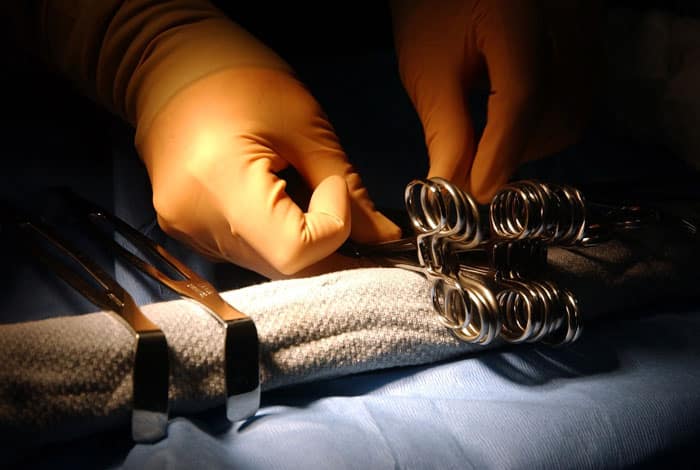
This post provides detailed information on the surgical technician job description, including duties, tasks, and responsibilities.
(You will be able to download the surgical technician job description template in pdf below.)
It also highlights the major requirements that you may be expected to fulfill to be hired for the surgical technician role.
What Does a Surgical Technician Do?
A surgical technician works alongside surgeons, surgical assistants, nurses, and anesthesiologists during medical procedures.
They work in surgical or peri-operative areas and settings including: physicians or dentists who perform outpatient surgery, outpatient care centers, ambulatory surgery center, and hospitals.
The surgical technician job description entails assisting in ensuring that the operating room environment is safe, equipment functions properly, and that the operative procedure is performed under conditions that maximize patient safety.
Their role requires them to handle the instruments, scrubs, sutures, and various surgical sponges utilized from extremely small neurosurgical procedures, to much larger lap sponges which are used during surgical procedures conducted in or on larger areas of the body.
They also handle irrigation fluids and medication.
They also perform basic tasks such as preparing sterile dressings, checking patients’ medical charts and consent forms.
They also provide training for other operating room personnel as a vital part of the surgical team.
Surgical technicians are responsible for preparing patients, rooms, and equipment for pending surgical procedures; and rendering assistance during those procedures as part of a team of operating room professionals.
They have the duty to properly disinfect and assemble all the equipment needed for an operative procedure, verify that the equipment is in working order, and place sterile solutions where doctors can easily reach them.
They assist in the cleaning, shaving, and disinfecting the areas of a patient’s body that surgical procedure will be performed on.
The surgical technician work description also involves moving patients to the OR and appropriately positioning them on the operating table using sterile surgical drapes to cover them pending surgery.
It also involves passing sterile surgical equipment, such as scalpels and forceps to surgeons in the course of the operation.
The technicians are responsible for transporting a patient back to his or her room at the completion of a surgical procedure.
To become a surgical technologist you must complete a postsecondary certificate or Associate’s degree program from an accredited institution/body, through the Commission on Accreditation of Allied Health Education Programs (CAAHEP) which relies on information gathered by a collaborative effort of the Association of Surgical Technologists (AST) and the American College of Surgeons (ACS).
You must be knowledgeable in utilizing sterile and aseptic techniques. Surgical technologist should possess knowledge of human anatomy, surgical procedures, and the ability to utilize tools and technologies that would facilitate the physicians’ performance of invasive therapeutic and diagnostic procedures.
It is also important that surgical technicians possess manual dexterity since their job requires them to transport patients in and out of the Operating Room prior to and after surgical procedures. They must be able to lift 50lbs without assistance.
Surgical Technician Job Description Example/Sample/Template
Surgical technologists perform various functions providing patients with necessary care and support required prior to surgery, as well as rendering assistance to the surgeon during surgery.
The major tasks, duties, and responsibilities of the surgical technician are listed in the job description example below:
- Monitor patients’ vital signs and observe their status
- Assist in cutting sutures, and keep track of items like sponges and needles; operate lights used during surgical procedures
- Assist in dressing patients’ wounds
- Clean the OR after a surgical procedure in preparation for the next surgery
- Prepare and dispose lab specimens after use
- Prepare and secure all supplies required for surgical intervention
- Prepare and maintain sterile field in OR
- Carryout instrument counts before the commencement of each surgical procedure
- Assist in monitoring patients during surgical procedures
- Provide supportive pre-operative patient care
- Provide surgical scrub on all procedures, including minor and major surgeries
- Collect and label specimens taken during surgery
- Adhere to all departmental, state, and federal safety procedures.
Surgical Technician Requirements – Skills, Knowledge, and Abilities for Career Success
To get hired and succeed in the surgical technician career, you need to have certain skills, qualities, abilities, qualifications, educational background, etc.
These will help you to be effective in performing the obligations, purpose, and objectives of the surgical technician role that you might be assigned.
Highlighted below are major requirements most employers recruiting for the surgical technician position commonly expect prospective candidates to have:
- Education: A minimum of High School Diploma or GED is required but an Associate degree is usually preferred
- Certification: A surgical technician certification from an accredited school or training program is required. First Aid and CPR and BCLS certification is also required
- Knowledge: Previous clinical experience in Operating Room (OR) environment is required. Familiarity with all surgical instruments and equipment; and a working knowledge of sterile techniques and aseptic procedures are required
- Physical dexterity: The surgical technician must be energetic and able to lift 50lbs.
Download surgical technician job description template (pdf)
Conclusion
If you are hiring for the surgical technician position in your organization and need to make a good job description to attract the best candidates to your organization, the sample description and details about the duties and responsibilities of surgical technicians provided in this post will help you to create one.
This post is also helpful to individuals interested in becoming a surgical technician to learn about the career, including what employers require and how to succeed on the job.




